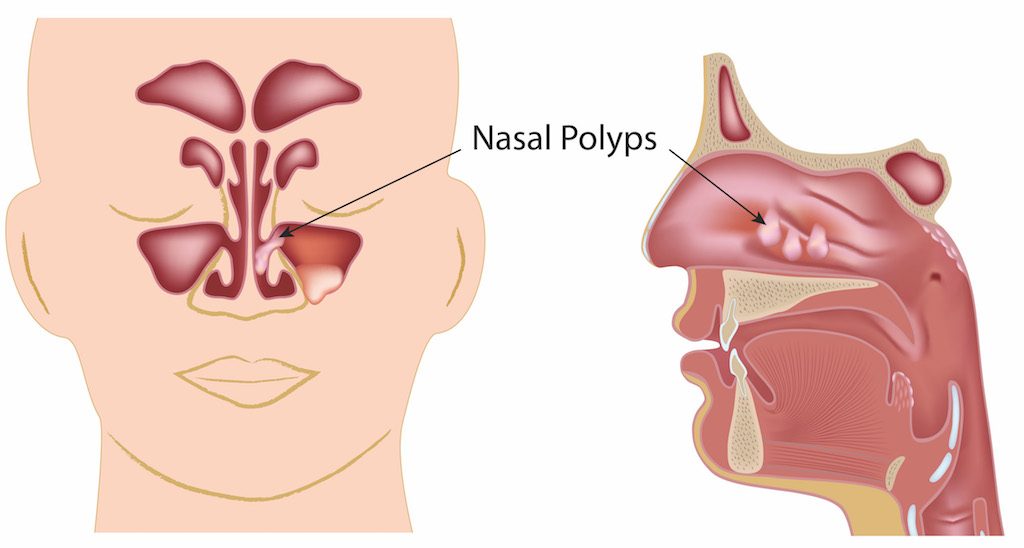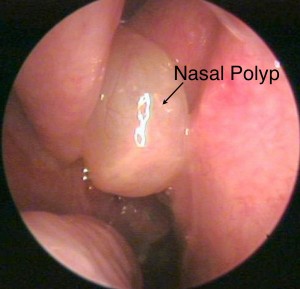 What are Nasal Polyps?
What are Nasal Polyps?
Nasal polyps are soft, non-cancerous growths that develop in the lining of the nasal passages or sinuses. Polyps can range from small to large, are tear-drop shaped, and can present as individual growths or appear in clusters. Patients with nasal polyps may or may not have symptoms depending on the number and size of the polyps. This condition may also be referred to as nasal polyposis or polypoid lesions.
Symptoms
Small polyps often do not create any noticeable symptoms and do not require treatment. However, larger polyps, while painless, can obstruct the sinuses as well as contribute to frequent sinus-related infections, nasal obstruction, and snoring.
What are the Most Common Symptoms of Nasal Polyps?
Often, people are unaware that they have nasal polyps and experience no symptoms at all. In other cases, symptoms can sometimes mimic those of the common cold. If you have experienced any of the following symptoms for more than 10 days, consult an otolaryngologist, also referred to as an ear, nose, and throat (ENT) specialist, to be evaluated for polyps:
- Snoring
- Sleep apnea
- Nasal congestion
- Post nasal drip
- Frequent sinus infections
- Pressure in the forehead and sinuses
- Stuffiness
- Loss of taste
- Loss of smell
- Sneezing
Nasal Polyps Can Cause Nasal Obstruction
If polyps become enlarged, they can lead to chronic congestion or sinusitis. In severe cases, they can cause nasal obstruction. So if you have trouble breathing, double vision, swelling around the eyes or a severe headache with high fever, call 911.
What Causes Nasal Polyps?
Nasal polyps result from inflammation in the mucous membrane of the nasal passages and sinus cavities. Genetic factors or allergic responses may lead to polyps. There are many theories about the origin of nasal polyposis, but researchers remain unsure about their cause. People who have nasal polyps may just have a more active immune response within their mucosa than others. Although more often seen in young to middle-aged people, polyps can develop at any age.
There are, however, some associations with other conditions. People with nasal polyps often also have:
- Asthma
- Allergic rhinitis
- Hay fever
- Cystic fibrosis
- NSAID or aspirin allergy
How Do Doctors Diagnose Nasal Polyps?
During an exam for polyps, an ENT will typically ask about your medical history, including symptoms, related conditions, and family history of sinus issues. After taking note of your health history, the doctor will perform a visual exam of the nasal passages using a lighted instrument. He or she may then use a nasal endoscope (a narrow, flexible tube with a lighted camera) to look more closely at the nasal and sinus passages.
During the nasal endoscopy, the ENT may take a biopsy for further analysis. Then, for a more comprehensive view of the polyps or to rule out other conditions, the doctor may order a CT scan. Finally, depending on the suspected origin, the doctor may also call for an allergy test or cystic fibrosis evaluation.
Doctors usually treat nasal polyps with medications or surgery. Patients can also make changes in lifestyle habits to cope with the condition. It is important for patients and doctors to work together on a plan to manage polyps because the condition can recur. Therefore, nasal polyps treatment is typically ongoing.
Although it can feel overwhelming to deal with nasal polyps, you can start your path to relief with the help of a skilled specialist. Our physicians here at Fort Worth ENT & Sinus are here to help. To make an appointment with one of our ear, nose, and throat specialists, call 817-221-8848 or request an appointment online today.

